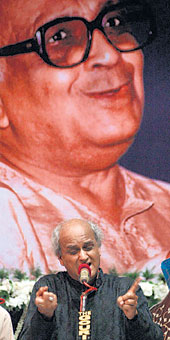 |
Khayal maestro Ulhas Kashalkar performed at a programme held in memory of the late singer, musicologist and author Kumar Prasad Mukherji at Rabindra Sadan on June 17. The concert was organised by Mukherji’s disciples and admirers, the state information and cultural affairs department and Jalsaghar.
Speakers including Meera Bhattacharjee, the wife of the chief minister, author Buddhadeb Guha, poet Joy Goswami and cricketer Raju Mukherjee paid rich tributes to Mukherji before the concert began.
Kashalkar, a Kumar Mukherji favourite, seemed to have chosen ragas and compositions fit for the occasion. For instance, Gaud Malhar was one of the ragas Mukherji specialised in. There was more of slow raga elaboration in the vilambit khayal than it was usual for Kashalkar. This was something Mukherji had wanted to hear in Kashalkar’s recitals and seemed to be a tribute to him by the singer. Kashalkar also opted for both Jaipur-style and Gwalior-style taankari in the vilambit ? something he avoids normally. The drut khayal in Gaud Malhar, the Jaipur-style jhaptal khayal in Sawani and the Desh drut khayal (a Mukherji favourite) and a tarana were all excellently sung. Milind Pote and Purushottam Walawalkar, both from Mumbai, supported him on the tabla and harmonium respectively.
The RKM Institute of Culture, Golpark presented a jugalbandi of Rajendra Prasanna (flute) and Anup Dasgupta (guitar) at Vivekananda Hall on June 15.
Prasanna, with his classy shehnai and flute, had been an indispensable musician in the arena of commercial recordings in Delhi for over two decades. That he is more focused on flute was evident on this occasion.
Raga Gorakh Kalyan was the choice of the artistes. The flute-guitar blended well in the alaap as the raga offered beautiful cords and helped both to take flights of imagination. With the advent of rhythm in jod, the flute took the lead. The slow rupak gatkari revealed that Dasgupta’s technique, though tuneful, was nowhere near Prasanna’s brilliance. The guitar depended heavily on cues provided by the flute’s flawless sense of rhythm to stay within the cycle of seven beats while crafting tihais.
The jhala, replete with the sawal-jawab with Debashis Sarkar’s tabla, was led by the flute alone. The guitar helped by adding the rich resonance of chikari only.










